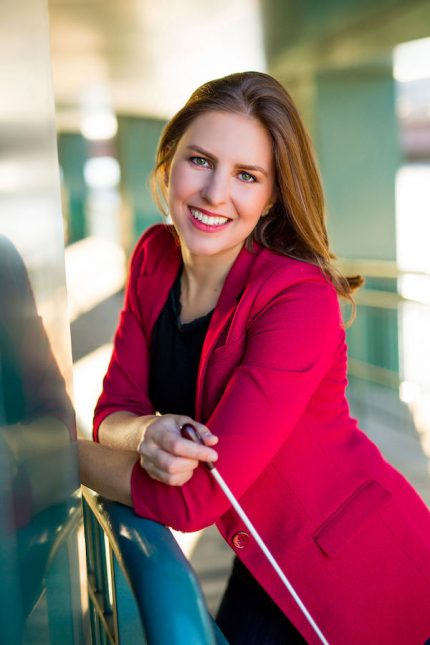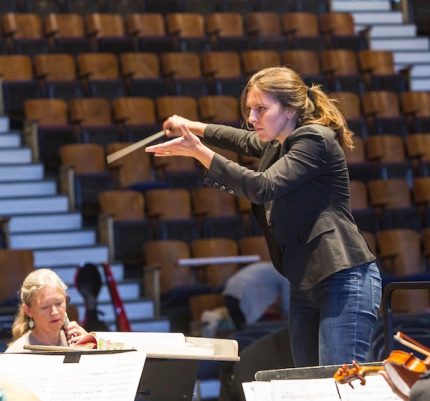Opera checks all the boxes for COT’s Lidiya Yankovskaya

Some musicians discover their life’s calling as very young children sitting in a concert hall or listening to a recording. At age four or five, they are entranced by a soprano singing Mimi or a conductor leading a magisterial Mahler symphony. They start studying music, and, a decade or two later, a few actually find themselves front and center on the international stage.
That is not the origin story of Lidiya Yankovskaya’s career.
“Honestly, I didn’t know I was going to be a professional musician,” said the Russian-born conductor, music director of Chicago Opera Theater since 2017. “Or at least I didn’t admit it to myself until the end of my college years.”
Since graduating Vassar College and earning a master’s degree in conducting from Boston University, the 33-year-old conductor has amassed an impressive resume. Among her guest conducting credits are the Washington National Opera, the Spoleto Festival USA, Wolf Trap Opera, Beth Morrison Projects and the Center for Contemporary Opera in New York City. She has held posts with several Boston-area music groups including Harvard’s Lowell House Opera and the Boston New Music Festival. From 2010 to 2017 Yankovskaya was music director of Boston’s Juventas New Music Ensemble.
Making her COT debut last season, she won strong reviews conducting two Chicago premieres: Tchaikovsky’s one-act opera, Iolanta, and Jake Heggie’s Moby-Dick.
Yankovskaya launches COT’s 47th season Saturday night with two more Chicago premieres, a pair of one-act operas.
Rachmaninoff’s Aleko, composed in 1892, is a tale of jealousy and thwarted love among a traveling band of Romani gypsies. Everest, a 2015 work by composer Joby Talbot and librettist Gene Scheer, is based on a real-life story of climbers attempting to scale Mount Everest.
Yankovskaya was born in St. Petersburg. Her mother was a music lover, and music was “always a priority” in the household, she said. She started ballet lessons at age three and began studying piano and violin and singing with a local choir at age five.
She and her mother emigrated to the U.S. when Yankovskaya was nine, landing in a small town just outside Albany, N.Y. The local high school had a strong music program, and she continued with violin and piano lessons. She conducted her first concert at age 17.
“I won a concerto competition [as a pianist] with the orchestra in which I was a violinist,” Yankovskaya said. “It was a Mozart concerto, and the conductor encouraged me to lead rehearsals from the piano, which would have happened during Mozart’s time. He saw that conducting came naturally to me, and he came up to me after the performance and said, ‘How do you feel about conducting something at our next concert?’
I would never have even considered getting up on the podium. I would never have even thought it was possible, though I was regularly leading rehearsals and I accompanied the choirs from the piano. But it was not something that ever crossed my mind that I could do.”

With conducting, however, Yankovskaya found a perfect fit for her talents and temperament. The often-solitary career of a solo violinist or pianist didn’t appeal to her, and she craved the collaboration of conducting an orchestra or, especially, directing an opera company.
“Throughout my school years, I was heavily focused on music,” Yankovskaya said. “But I also did many other things. I went to a liberal arts college, and I studied philosophy there as well as music. I looked at conservatories for college, but I realized that just studying music at that point in my life was not right for me. I wanted a broader education.”
Opera, with its often-chaotic interplay of multiple moving parts, seemed like the best of all possible musical worlds.
“Opera brings everything together,” Yankovskaya said. “I love working with orchestras, and I still work regularly with symphonies. In opera I still get to work with an orchestra. I also get to work with choruses and soloists and stage directors and designers. I get to think not only about the music itself but also about the drama and the social implications of any opera that we’re mounting, how all of them tie into our lives. I just love that collaborative part of opera.”
With Everest and Aleko, she will be collaborating with exceptionally large forces. Both operas will feature ballet dancers and the 140-voice Apollo Chorus in addition to principal singers and a 70-piece orchestra.
Both operas, Yankovskaya said, deal with obsession. The lover in Aleko is consumed by jealousy. In Everest, the climbers willingly risk their lives to achieve an obsessive dream of conquering a legendary mountain peak. But the operas share another link as well.
“The thing that connect these two piece is the chorus,” Yankovskaya said. “In Aleko, there are some very large, beautiful chorus numbers that stand, in a way, outside of the opera. The chorus is not part of the action. As in Everest, they are very important to the fabric of the music and the story. In Everest, the chorus is the mountain, a Greek chorus commenting on what’s happening. That’s what makes these two operas ideal for us in the context of partnering with the Apollo Chorus.”
Since Yankovskaya’s arrival at COT, the company has made some major changes. A new general director, Ashley Magnus, succeeded Douglas Clayton in January. The company now hires covers for principal roles, said Yankovskaya, and revamped the stipend plan for its young artists program. COT is uniquely suited, she said, to forging new directions for American opera.
“COT is in a very unusual position,” she said. “It has the flexibility to really explore the art form and move in different directions. Massive opera houses like Lyric Opera or the Met have incredible resources and perform amazing works, but they’re also tied down by how massive they are. They have a very important responsibility to present the historic repertoire, but that limits other things they can explore.
“Regional opera houses can face the same thing because a regional opera house may be the only opera company for an entire state. And again, there are so many responsibilities that fall on their shoulders.
“We’re in a really great situation because we really don’t have to present the Aidas and the Bohemes. Lyric does that beautifully. But we’re large enough to do works like Moby-Dick and do them on a high level. We can work outside the box in repertoire and also do smaller chamber works like David T. Little’s Soldier Song, which we’ll have in the spring at the Museum of Contemporary Art.”
Chicago Opera Theater has had multiple identities since its founding in 1974. At the start, it was a showcase for young singers in operas sung in English. In the 2000s, the company offered a rich diet of sparkling Baroque opera and 20thcentury Chicago premieres.
Yankovskaya wants to introduce unjustly neglected operas by famous composers, like Tchaikovsky’s Iolanta and Rachmaninoff’s Aleko, to Chicago and also introduce new work and new composers.
“I don’t want to just conduct,” she said. “I want to make an impact on the field.”
Chicago Opera Theater presents Joby Talbot’s Everest and Rachmaninoff’s Aleko 7:30 p.m. Saturday and 3 p.m. Sunday at the Harris Theater. chicagooperatheater.org
Posted in Articles


